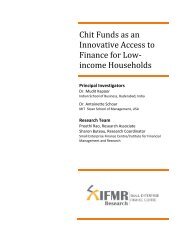Government of India Volume I: Analysis and Recommendations
Government of India Volume I: Analysis and Recommendations
Government of India Volume I: Analysis and Recommendations
You also want an ePaper? Increase the reach of your titles
YUMPU automatically turns print PDFs into web optimized ePapers that Google loves.
3. Insurance Laws Amendment Bill, 2008<br />
4. Life Insurance Corporation Act, 1956<br />
5. Life Insurance Corporation (Amendment) Bill, 2009<br />
6. General Insurance Business (Nationalisation) Act, 1972<br />
7. Marine Insurance Act, 1963<br />
8. Motor Vehicles Act, 1988<br />
9. The Actuaries Act, 2006<br />
10. Employees’ State Insurance Act, 1948<br />
11. Companies Act, 1956 (to a limited extent)<br />
12. <strong>India</strong>n Contract Act, 1872 (to a limited extent)<br />
13. The Pension Fund Regulatory <strong>and</strong> Development Authority Bill, 2011<br />
ANNEXES<br />
14. Employees’ Provident Funds <strong>and</strong> Miscellaneous Provisions Act, 1952 (Employees’<br />
Provident Fund Scheme, 1952, Employees’ Pension Scheme, 1995, Employees’ Deposit-Linked<br />
Insurance Scheme, 1976)<br />
15. Income Tax Act, 1961 (to the extent relevant for recognised provident <strong>and</strong> superannuation<br />
funds)<br />
16. Public Provident Fund Act, 1968<br />
17. <strong>Government</strong> Savings Bank Act, 1873<br />
18. <strong>Government</strong> Savings Certificates Act, 1959<br />
19.7. Working Group on payments<br />
19.7.1. Composition<br />
Dr. P.J. Nayak - Chairman<br />
Shri Ranjit Tinaikar - Member<br />
Shri Uttam Nayak - Member<br />
Shri Bharat Poddar - Member<br />
Shri A.P. Singh - Member<br />
Shri Abhishek Sinha - Member<br />
19.7.2. Terms <strong>of</strong> reference<br />
1. To identify what are the systemic risks to the financial system <strong>and</strong> to the real economy<br />
from payment systems. Payment systems can be systemically important, partly<br />
because shocks can originate within them, resulting in operational risks, but also<br />
because they can act as channels for propagating shocks originating outside their<br />
operations, through credit <strong>and</strong> liquidity markets. An underst<strong>and</strong>ing <strong>of</strong> the potential<br />
systemic credit, liquidity <strong>and</strong> operational risks in payment systems is thus required,<br />
so that criteria for identifying systemically important payment participants<br />
<strong>and</strong> systemically important payments systems can be formulated. Finally, to assess<br />
whether there are risks to financial stability arising from encouraging competition<br />
<strong>and</strong> innovation in payments.<br />
2. To evaluate whether the regulatory system should cover all payment systems without<br />
exception, or instead merely those which are systemically important. Alternatively,<br />
to examine whether there should be a separate regulator for retail <strong>and</strong> smallvalue<br />
payment systems as compared to systemically important payment systems.<br />
174 FINANCIAL SECTOR LEGISLATIVE REFORMS COMMISSION



